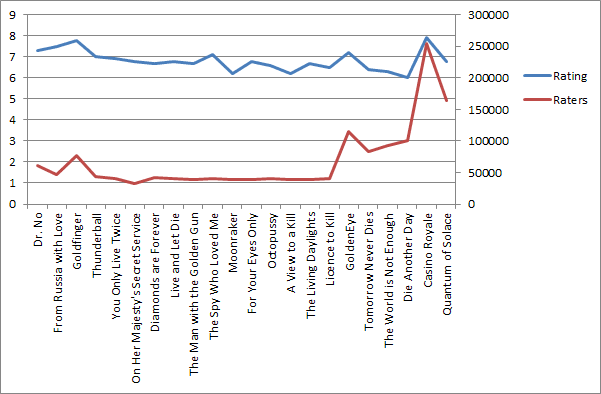The first semi-final was pretty good. Good work, Sweden, and a particular mention to Ireland and Belgium, who both came across much better than I expected. Most of my preferred songs got through – although Serbia didn’t help themselves with their bizarre Hello Kitty outfits and didn’t make the cut. We rightly said au revoir to Slovenia and Montenegro, with the dreary Lithuanian entry an unexpected qualifier.
Tonight it’s the second semi final and 10 of tonight’s 17 songs will progress through to Saturday’s final to join Belarus, Belgium, Denmark, Estonia, France, Germany, Ireland, Italy, Lithuania, Moldova, Netherlands, Russia, Spain, Sweden, the UK and Ukraine on stage.
Here are my thoughts on the 17 songs vying for those coveted final places coming up tonight (from 8pm on BBC Three).
The Good
- Azerbaijan – This is nice enough middle-of-the-road Eurovision fare, albeit with a key change that’s almost squashed. I actually prefer it to their winning song Running Scared, but “Hold me/Unfold me”? No.
- Finland – Now here’s a fan favourite and no mistake. It’s pretty silly but has its camp sense of humour in exactly the right place and the result is good, toe-tapping fun.
- Hungary – This is a lovely, gentle little number and not traditionally Eurovision at all. It might not come off as well live as in the pristinely produced studio recording but it’s another good entry from Hungary and I hope it does well.
- Latvia – The first couple of seconds are awful but suddenly it segues into a genuinely catchy chorus – and then they ruin it all with some naff rapping. Despite that it’s very jolly and that could be enough to carry it through.
- Malta – Yeah, this is a bit twee but it’s sweet and hard not to like. It’s gentle, tuneful and, let’s face it, a nice change for Malta from a big-lunged ballad.
- Norway – That bleating noise on the backing track is pretty annoying but the vocals are stark and the whole thing has a relentless drive to it.
- San Marino – This is another song that leaves it almost too late to get going. Two minutes in, it finally goes up a few gears and we have one third of a good song. Most of it is pretty middling but the end, including a handsome key change, push it up to the next level.
- Switzerland – Not only have Switzerland got a very well-thumbed copy of a rhyming dictionary, it appears to be a simple primary school version. Nevertheless, this is hard to dislike and the Salvation Army singers manage to beat you into submission through repetition.
The Bad
- Armenia – This is in danger of turning into the Stonecutters song from The Simpsons. “Lonely planet/Who has done it?” is as good as the lyrics get and they are sufficiently cringeworthy to spare us considering the reasonable melody and render this worth avoiding. The end’s annoying too. Still, key change.
- Israel – Israel does seem to swing back and forth wildly with its entries. Last year’s was fun but this is dreary entry and a perfect moment for popping out to make a brew.
The Ugly
- FYR Macedonia – Good grief. With the rest of the former Yugoslavia out of the running, Macedonia could be on the receiving end of a lot of local douzes, and Macedonia’s answer to Freddie Mercury (Lozano) and Monserrat Caballé (Esma) will certainly need them. Not only did they forgot to bring a decent song, Esma genuinely appears to be gargling at one point. It’s like Lozano’s great aunt has turned up drunk to ruin his big moment on The X Factor. Are these two even talking to each other?
- Greece – Bless Greece. Things have got so bad, they’re left with a song in honour of booze. I’m entirely in favour of the sentiment but some funky instrumentation can’t get away from vocals that sound like the subject of the song is also its fuel.
- Romania – Ladies and gentlemen, we’ve struck the motherlode. This is almost impossible to judge but I’d like to see it get the exposure it deserves on Saturday night. It’s kind of got a good melody but that’s hard to talk about without… Well, you really have to see for yourself. This is going to be Friday morning’s water cooler momment and I wouldn’t want to spoil it for you. I just hope he finds them again.
The Rest
- Albania – A fairly standard rocky chorus and an OK guitar solo are undermined by letting the guitarist’s gravelly blandless loose on the opening verse.
- Bulgaria – Oh dear. This starts promisingly enough with a bit of Eurovision Percussion but then the singing says the same for three minutes, with no variety or structure aside from a bit of wailing near the end. There’s a drumming interlude that’s enjoyable enough but otherwise it’s only real use is as background music in an Indian restaurant.
- Georgia – It’s not bad when it gets going, pulling out a nice key change and (unintentionally, I’m sure) name-checking Denmark’s best entry of recent years. It could do well but lyrically it’s pretty flat and the opening is dull.
- Iceland – Slightly bland but it builds gently, has a good key change and Iceland’s Badly Drawn Boy sings it well.



Recent comments